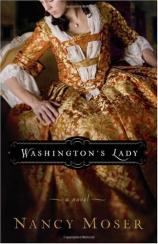Washington's Lady: Ladies of History Series #3
Review
Washington's Lady: Ladies of History Series #3
Nancy Moser has a competent touch with inspirational fictional biographies, as she proved with JUST JANE (her novel about Jane Austen) and MOZART'S SISTER. In WASHINGTON'S LADY she pens one of her best to date as she portrays the life of Martha Washington, the wife of America's first president.
Moser starts her novel on a somber note. After bearing four children in seven years of marriage --- and losing two --- Martha's beloved husband has died, leaving her with the two surviving toddlers and a full cup of grief. The first chapter is a litany of the deaths the 26-year-old Martha has experienced, which have marked her deeply. She realizes that to love is to risk pain and decides she will focus on protecting who she has left. Perhaps, she thinks, she will not love again.
However, the petite and somewhat plump Martha is now one of the wealthiest widows in Virginia, and it's not long before suitors are coming to call. Muses Martha, “It was the norm to marry two or three times within a lifetime. As far as being a woman with a fortune? I was expected to remarry in a timely manner.” Martha quickly becomes weary of handling everything by herself. She thinks of the children she'd still like to have and feels lonely. Soon, she prays that God will send her the right man again to be her partner and a father to her young children.
The right man is, of course, Colonel George Washington, who Moser portrays as a dapper, larger-than-life figure who nonetheless is weakened from dysentery and suffers pain from bad teeth. Washington wins over Martha and her two children, but her mother cautions her that George is in love with Sally Fairfax, the wife of one of his best friends and neighbors, and “…you are the richest widow in Virginia. Colonel Washington is…much beneath you.” Despite her warnings, love wins over reason and Martha and George are married. As they work through the intimacies of married life, Moser places them against the backdrop of squabbling between England and the colonies, which eventually will lead to the Revolutionary War and George's presidency. George is shown as a man who wishes to settle down at home and care for his land, yet is constantly at the beck and call of the military and the needs of his fledgling country.
Moser does a good job showing how Martha's strengths, such as her love for her children, are also her greatest weaknesses (she suffers from anxiety, she spoils both children terribly). Because of Martha's possessive nature toward the children and unwillingness to give her husband free reign in disciplining them, George is unable to take a firm hand with them, despite his desire to do so. He tells Martha, “Happiness stems from leading a life of control, knowing the margins of society, and making wise choices.” Yet, at least with Jacky, the consequences of Martha's spoiling unfold throughout the novel. Daughter Patsy's struggles with epilepsy are a poignant thread woven into the story, which ends in yet another grief for the couple.
As events lead up to the Washington presidency, Moser handles her story well, giving readers a nice balance of historical events and glimpses into the relationship between George and Martha. Occasionally, Martha seems a little too prescient: “…there was something about George that hinted of a destiny beyond the norm….” Once in a while, those not knowledgeable about the Revolutionary War era may find themselves confused, as when the House of Burgesses is dissolved by Governor Fauquier, then again 11 pages later by a Governor Botetourt. It may require some digging on the part of the reader to fully understand the historical events here.
However, Moser does a lovely job incorporating rich historical details about the Washington family, from the way Martha decorated the rooms at Mt. Vernon to the recipes she made for company. Moser integrates these details naturally into the story. She also portrays some of the weaknesses of the couple. The Washingtons liked the finer things of life; in one passage Martha admits that she and George have exquisite taste. Moser chronicles some of their purchases for the children, which are shocking for even today's readers: a gold-plated toy whip for Jacky, a tea set and silver-plated spoons for Patsy.
The only disappointment I had is that the novel skips over the years of Washington's presidency, then ends with the time period after his death. But the slice of Martha Washington's life that Moser offers in this engaging novel are enough on their own to provide a good inspirational historical read. The discussion questions intended for book clubs are also much deeper and more interesting than the usual fare, and book clubs will find plenty here to discuss and enjoy.
Reviewed by Cindy Crosby on June 1, 2008
Washington's Lady: Ladies of History Series #3
- Publication Date: June 1, 2008
- Genres: Christian, Historical Fiction
- Paperback: 414 pages
- Publisher: Bethany House Publishers
- ISBN-10: 0764205005
- ISBN-13: 9780764205002





